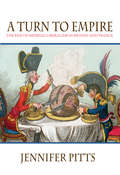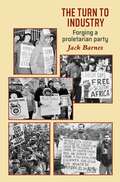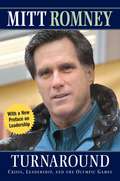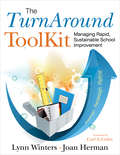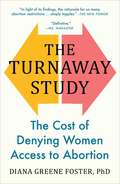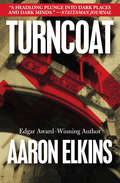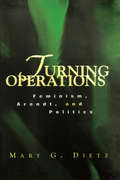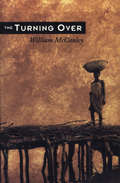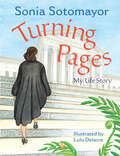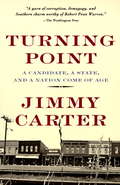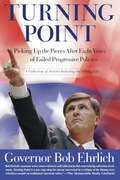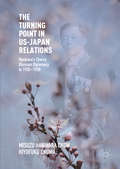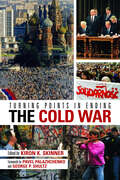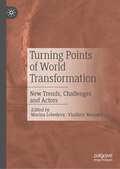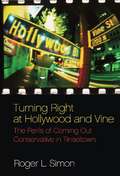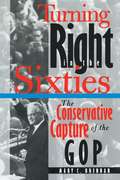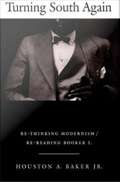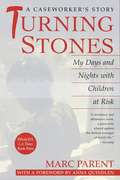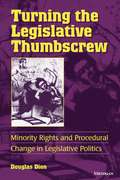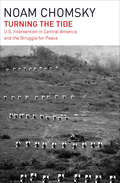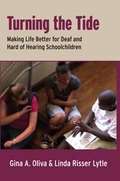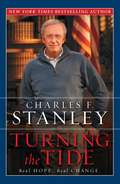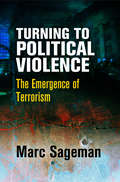- Table View
- List View
A Turn to Empire: The Rise of Imperial Liberalism in Britain and France
by Jennifer PittsA dramatic shift in British and French ideas about empire unfolded in the sixty years straddling the turn of the nineteenth century. As Jennifer Pitts shows in A Turn to Empire, Adam Smith, Edmund Burke, and Jeremy Bentham were among many at the start of this period to criticize European empires as unjust as well as politically and economically disastrous for the conquering nations. By the mid-nineteenth century, however, the most prominent British and French liberal thinkers, including John Stuart Mill and Alexis de Tocqueville, vigorously supported the conquest of non-European peoples. Pitts explains that this reflected a rise in civilizational self-confidence, as theories of human progress became more triumphalist, less nuanced, and less tolerant of cultural difference. At the same time, imperial expansion abroad came to be seen as a political project that might assist the emergence of stable liberal democracies within Europe. Pitts shows that liberal thinkers usually celebrated for respecting not only human equality and liberty but also pluralism supported an inegalitarian and decidedly nonhumanitarian international politics. Yet such moments represent not a necessary feature of liberal thought but a striking departure from views shared by precisely those late-eighteenth-century thinkers whom Mill and Tocqueville saw as their forebears. Fluently written, A Turn to Empire offers a novel assessment of modern political thought and international justice, and an illuminating perspective on continuing debates over empire, intervention, and liberal political commitments.
The Turn to Industry
by Jack BarnesThe Turn to Industry: Forging a Proletarian Party is about the working-class program, composition, and course of conduct of the only kind of party worthy of the name ‘revolutionary’ in the imperialist epoch. The only kind of party that can recognize the most revolutionary fact of this epoch—the worth of working people, and our power to change society when we organize and act against the capitalist class in all its economic, social, and political forms. This book is about building such a party in the United States and in other capitalist countries around the world. Jack Barnes is National Secretary of the Socialist Workers Party.
Turnaround: Crisis, Leadership, and the Olympic Games
by Mitt Romney Timothy RobinsonMitt Romney, Governor of Massachusetts, built a career turning around troubled companies. As the CEO of Bain Capital and Bain & Company, he and his firm helped propel the success of hundreds of companies, from venture start-ups to the world's largest corporations. In 1999, the Salt Lake Winter Olympic Games Organizing Committee turned to him to take over and run the Salt Lake Olympic Games. Romney was reluctant--and with good reason.Sullied by scandal, on the brink of financial disaster, and with federal investigators, bankers, and the press at its door, the Salt Lake Organizing Committee's senior managers admitted the organization was paralyzed.But Romney had too much American patriotism to let it become a catastrophe for his country. So he accepted the biggest turnaround challenge of his life.In Turnaround, Romney reveals how he tackled the seemingly insurmountable obstacles facing the Salt Lake Winter Games. In Turnaround, you'll learn how Romney and his management team: eliminated a financial crisis and delivered a profitable Olympic Gamesbuilt a culture of excellence that inspired gold medal performances from the employeesskillfully won the support of government officials, corporate sponsors, local residents, athletes and the international Olympic movement.With Romney at the helm, and through the teamwork, tenacity, and creativity of the staff he assembled and supported, the organizing committee succeeded against the odds in producing one of the finest Olympic Games ever--a proud moment for America, a great installment in Olympic history, and a valuable object lesson in what effective management and leadership can do.
The TurnAround ToolKit: Managing Rapid, Sustainable School Improvement
by Dr Lynn S. Winters Dr Joan L. HermanThe TurnAround Toolkit outlines a formative evaluation program for enhancing school and student achievement. Included are pocket summaries for each chapter and an online "toolkit."
The Turnaway Study: Ten Years, a Thousand Women, and the Consequences of Having—or Being Denied—an Abortion
by Diana Greene Foster&“If you read only one book about democracy, The Turnaway Study should be it. Why? Because without the power to make decisions about our own bodies, there is no democracy." —Gloria Steinem &“Dr. Diana Greene Foster brings what is too often missing from the public debate around abortion: science, data, and the real-life experiences of people from diverse backgrounds…This should be required reading for every judge, member of Congress, and candidate for office—as well as anyone who hopes to better understand this complex and important issue.&” —Cecile Richards, cofounder of Supermajority, former president of Planned Parenthood, and author of Make Trouble A groundbreaking and illuminating look at the state of abortion access in America and the first long-term study of the consequences—emotional, physical, financial, professional, personal, and psychological—of receiving versus being denied an abortion on women&’s lives.What happens when a woman seeking an abortion is turned away? Diana Greene Foster, PhD, decided to find out. With a team of scientists—psychologists, epidemiologists, demographers, nursing scholars, and public health researchers—she set out to discover the effect of receiving versus being denied an abortion on women&’s lives. Over the course of a ten-year investigation that began in 2007, she and her team followed a thousand women from more than twenty states, some of whom received their abortions, some of whom were turned away. Now, for the first time, the results of this landmark study—the largest of its kind to examine women&’s experiences with abortion and unwanted pregnancy in the United States—have been gathered together in one place. Here Foster presents the emotional, physical, and socioeconomic outcomes for women who received their abortion and those who were denied. She analyzes the impact on their mental and physical health, their careers, their romantic lives, their professional aspirations, and even their existing and future children—and finds that women who received an abortion were almost always better off than women who were denied one. Interwoven with these findings are ten riveting first-person narratives by women who share their candid stories. As the debate about abortion rights intensifies, The Turnaway Study offers an in-depth examination of the real-world consequences for women of being denied abortions and provides evidence to refute the claim that abortion harms women. With brilliant synthesis and startling statistics—that thousands of American women are unable to access abortions; that 99% of women who receive an abortion do not regret it five years later—The Turnaway Study is a necessary and revelatory look at the impact of abortion access on people&’s lives.
Turncoat: A Novel Of Suspense (Ulverscroft Large Print Ser.)
by Aaron ElkinsPete Simon's all-American life was everything he ever wanted: a good home, a satisfying career, and a marriage still strong and loving after nearly twenty years. But in the days following the assassination of John F. Kennedy, everything is about to change.It starts with the appearance of an old man at his door, ranting madly about money, death, and forgiveness. The man is a stranger to Pete--but not to his wife Lily. Only later does the truth come out. The unwelcome visitor was Lily 's father, whom she had claimed died during World War II in their native France, executed by the Nazis.The next day, he truly is dead, his savagely beaten body washed up in a nearby marsh--and Lily disappears, leaving behind only a brief, enigmatic note asking Pete not to look for her.Now, with a business card from an antiques dealer in Barcelona as his only lead, Pete sets out on a twisted and perilous journey that will carry him to places where the hideous crimes of the Nazis remain fresh in the minds of those who cannot forget...or forgive. But each door Pete opens leads him deeper into a painful and shocking past that threatens everything he holds most dear. And suddenly he has become more than a confused and distraught husband; the bitter truths that he uncovers one by one in the search for Lily now make him--and her--the targets of desperate, dangerous men and their terrifying vengeance.
Turning Operations: Feminism, Arendt, Politics
by Mary DietzThrough the re-interpretation of influential thinkers such as Arendt, Weil, Beauvoir and Habermas, Mary G. Dietz weds the concerns of demcratic thought with that of feminist political theory, demonstrating how important feminist theory has become to democratic thinking more generally. Bringing together fifteen years of commentary on critical debates, Turning Operations begins with problems central to feminism and ends with a series of reflections on the "the politics of politics," inviting the reader to think more expansively about the expressly public nature of political life.
The Turning Over: A Novel
by William MccauleyFor several years, Robert Kelley lived a primitive and contented life in a fishing village in the mangrove swamps of Sierra Leone. There, he developed and managed a project that built a cooperative fisheries station to support remote coastal villages. His development work done, he reluctantly turns the station over to the corrupt government Fisheries Division, whom he knows from experience will simply steal its resources and go away, leaving the villagers poorer than ever. He travels to Freetown, the capital, to present his last report to his employer, an English development agency, and leave Sierra Leone for Mali to join Marie, with whom he's had an intermittent and intense love affair. But when he arrives in Freetown, his superior offers him another position, establishing and managing a new project in the heart of a politically unstable region of the country. Robert hesitates to accept, for he has already committed himself to joining Marie. His decision embroils him in unexpected and violent consequences. This love story of two expatriates is set against a lushly pictured West Africa in which the echoes of colonial, and even pre-colonial, life are still evident in the corrupting power of the Big Man and the equally corrupting privilege that surrounds white expatriate life. The Turning Over vividly portrays the last vestiges of that epoch in a world disintegrating into chaos.
Turning Pages: My Life Story
by Sonia SotomayorSupreme Court Justice Sonia Sotomayor tells her own story for young readers for the very first time!As the first Latina Supreme Court Justice, Sonia Sotomayor has inspired young people around the world to reach for their dreams. But what inspired her? For young Sonia, the answer was books! They were her mirrors, her maps, her friends, and her teachers. They helped her to connect with her family in New York and in Puerto Rico, to deal with her diabetes diagnosis, to cope with her father's death, to uncover the secrets of the world, and to dream of a future for herself in which anything was possible.In Turning Pages, Justice Sotomayor shares that love of books with a new generation of readers, and inspires them to read and puzzle and dream for themselves. Accompanied by Lulu Delacre's vibrant art, this story of the Justice's life shows readers that the world is full of promise and possibility--all they need to do is turn the page.Praise for Turning Pages:* "A sincere and insightful autobiography that also demonstrates the power of the written word. A winning addition to libraries that serve young readers." --School Library Journal, starred review"A personal and appealing book made to inspire." --Booklist"A thoughtful introduction to both the power of reading and an inspiring role model." --Kirkus Reviews"This book would be great as a read-aloud for class discussions of the Supreme Court, or United States government, or of important people in public service. It would also be good for independent reading by students interested in biographies or political figures." --School Library Connection
Turning Point
by Jimmy CarterThe former president's personal tale of political intrigue and social conflict during his first campaign for public office. Iluminates the origins of his commitment to human rights and bears further witness to the accomplishments of an extraordinary man.From the Trade Paperback edition.
Turning Point: A Candidate, a State, and a Nation Come of Age
by Jimmy CarterThe former president's personal tale of political intrigue and social conflict during his first campaign for public office. Illuminates the origins of his commitment to human rights and bears further witness to the events of an extraordinary man.
Turning Point: Picking Up the Pieces After Eight Years of Failed Progressive Policies
by Bob EhrlichIn his third book, former Maryland Governor Robert L. Ehrlich details the considerable damage inflicted to date, while analyzing how progressive policy has made America a far more insecure and weaker country. Turning Point makes the case for "plenty"; Barack Obama's transformative agenda has indeed remade America - to the detriment of our economy and culture. Culled from published opinion pieces authored by the Governor over the last eight years, Turning Point is a concise, articulate indictment of Western European style progressivism brought to America by its most charismatic (and dangerous) salesman.
Turning Point in China: An Essay on the Cultural Revolution
by William HintonA "documentary of revolution" which chronicled the land reform conducted by the Chinese Communist Party in Long Bow, a northern Chinese village in the 1940s.
The Turning Point in US-Japan Relations
by Misuzu Hanihara Chow Kiyofuku ChumaThis book analyses two international incidents in the 1920s shocked Japan and changed the way in which the country looked at the West. In the Paris Peace Conference, Japanese proposed Racial Equality Bill was defeated. In 1924, the US passed the immigration law that singularly excluded Japanese from immigration. Little known today, the two incidents made significant impact on Japanese mind-set. Detailed study of the two incidents reveals how they contributed towards the drastic transformation of Japan, from the liberal thinking Taisho Democracy in the 1920s to the violent rise of ultra- nationalism in the 1930s. Departing from a purely academic style writing, the story develops around the life of Hanihara Masanao, Japanese diplomat, Vice Minister of Foreign Affairs and ultimately the Ambassador to Washington during the fateful years of 1923-24. A unique pair of a Japanese Studies scholar in Australia and a leading investigative journalist in Japan undertook the work. Rigorous archival search extended over Japan, the United States, Australia and Europe resulted in a significant amount of new materials never published in English before.
Turning Points in Ending the Cold War
by Kiron K. SkinnerThe expert contributors examine the end of détente and the beginning of the new phase of the cold war in the early 1980s, Reagan's radical new strategies aimed at changing Soviet behavior, the peaceful democratic revolutions in Poland and Hungary, the events that brought about the reunification of Germany, the role of events in Third World countries, the critical contributions of Gorbachev and Yeltsin, and more.
Turning Points of World Transformation: New Trends, Challenges and Actors
by Marina Lebedeva Vladimir MorozovThis book explores the transformation of the political organization of the world as manifest in different spheres of world politics, in particular, in world politics, regional studies, interaction of MNCs and government agencies, and state responses to biogenic challenges. To achieve this goal, M. Lebedeva proposes the concept of a political organization of the world, which in modern conditions is in the process of transformation. The transformation of the political organization of the world is accompanied by megatrends (globalization, integration, democratization) and the opposite trends (de-globalization disintegration, dedemocratization). Interdisciplinary in nature, this book brings together scholars from Russia, the United States, and Canada, and provides a compelling perspective on the geopolitics of our time.
Turning Right at Hollywood and Vine
by Roger L. SimonAn Academy Award-nominated screenwriter and a mystery novelist, Roger L. Simon is the only American writer to pull off the amazing trick of being profiled positively in both Mother Jones and National Review in one lifetime. The stunning story of his political odyssey is told in this memoir, where Simon recounts his migration from financier of the Black Panther Breakfast Program to pioneer blogosphere mogul beloved by the right as a 9/11 Democrat.But Simon is beholden to neither right nor left in this tale of Hollywood chic run amuck, as he talks out of school about his adventures with, among many others, Richard Pryor, Warren Beatty, Timothy Leary, Richard Dreyfuss, Woody Allen, and Julian Semyonov, the Soviet Union's version of Robert Ludlum and also a KGB colonel who tempted Simon to join the KGB himself. Among the topics covered along the way:Is there a new blacklist in Hollywood, this one targeting conservatives?Simon's red-carpet tours of the People's Republic of China, Cuba, and the Soviet Union with Hollywood screenwriters and famous mystery novelists.Why Al Gore's documentary on global warming didn't deserve the Oscar on artistic grounds alone; and why the Academy's voting system is so corrupt.And, as they say, there is much, much more besides.
Turning Right in the Sixties
by Mary C. BrennanIdeologically divided and disorganized in 1960, the conservative wing of the Republican Party appeared to many to be virtually obsolete. However, over the course of that decade, the Right reinvented itself and gained control of the party. In Turning Right in the Sixties, Mary Brennan describes how conservative Americans from a variety of backgrounds, feeling disfranchised and ignored, joined forces to make their voices heard and by 1968 had gained enough power within the party to play the decisive role in determining the presidential nominee. Building on Barry Goldwater's short-lived bid for the presidential nomination in 1960, Republican conservatives forged new coalitions, began to organize at the grassroots level, and gained enough support to guarantee Goldwater the nomination in 1964. Brennan argues that Goldwater's loss to Lyndon Johnson in the general election has obscured the more significant fact that conservatives had wrested control of the Republican Party from the moderates who had dominated it for years. The lessons conservatives learned in that campaign, she says, aided them in 1968 and laid the groundwork for Ronald Reagan's presidential victory in 1980.
Turning South Again: Re-thinking Modernism/Re-reading Booker T.
by Houston A. Baker Jr.In Turning South Again the distinguished and award-winning essayist, poet, and scholar of African American literature Houston A. Baker, Jr. offers a revisionist account of the struggle for black modernism in the United States. With a take on the work of Booker T. Washington and the Tuskegee Institute surprisingly different from that in his earlier book Modernism and the Harlem Renaissance, Baker combines historical considerations with psychoanalysis, personal memoir, and whiteness studies to argue that the American South and its regulating institutions--particularly that of incarceration--have always been at the center of the African American experience. From the holds of slave ships to the peonage of Reconstruction to the contemporary prison system, incarceration has largely defined black life in the United States. Even Washington's school at Tuskegee, Baker explains, housed and regulated black bodies no longer directly controlled by slave owners. He further implicates Washington by claiming that in enacting his ideas about racial "uplift," Washington engaged in "mulatto modernism," a compromised attempt at full citizenship. Combining autobiographical prose, literary criticism, psychoanalytic writing, and, occasionally, blues lyrics and poetry, Baker meditates on the consequences of mulatto modernism for the project of black modernism, which he defines as the achievement of mobile, life-enhancing participation in the public sphere and economic solvency for the majority of African Americans. By including a section about growing up in the South, as well as his recent return to assume a professorship at Duke, Baker contributes further to one of the book's central concerns: a call to centralize the South in American cultural studies.
Turning Stones: A Caseworker's Story
by Marc ParentWhy does an infant die of malnutrition? Why does an eight-year-old hold a knife to his brother's throat? Or a mother push her cherished daughter twenty-three floors to her death? Marc Parent, a city caseworker, searched the streets--and his heart--for the answers, and shares them in this powerful, vivid, beautifully written book. WITH A NEW AFTERWORD BY THE AUTHOR.
Turning the Legislative Thumbscrew
by Douglas DionThe use of filibusters in the U. S. Senate by small numbers of members to prevent legislative action apparently desired by a majority of the members--as evidenced by the battles over civil rights legislation in the 1950s and 1960s--is legendary. Similar situations have existed in other legislative bodies over time. The fear that they will at some time be in the minority has inhibited actions by the majority groups to control the right of minority groups to block legislative action. And yet from time to time the majority in a legislative body has forced a change in the rules to control the rights of the minority. When does the majority seek to limit minority rights to obstruct legislation? Douglas Dion, in a unique study, develops a formal model to set out the conditions under which majorities will limit minority rights. He finds that when majorities are small, they will be more cohesive. This majority cohesion leads to minority obstruction, which in turn leads to majority efforts to force procedural change to control the ability of the minority to obstruct legislation. Dion then tests his findings in a rich consideration of historical cases from the nineteenth-century U. S. House of Representatives, the nineteenth- and twentieth-century U. S. Senate, the British House of Commons, and an account of the Austro-Hungarian Parliament written by Mark Twain. Turning the Legislative Thumbscrewis a work that combines formal analysis with extensive historical evidence to address an important problem in democratic theory. Specialists in legislative politics and American political development, as well as those more broadly interested in the relationship between democratic theory and institutional structure, will find the work of great interest. Douglas Dion is Assistant Professor of Political Science, University of Michigan.
Turning the Tide: U.S. Intervention in Central America and the Struggle for Peace (Debate Ser.)
by Noam ChomskyThe renowned activist examines the brutal reality of America&’s Cold War era foreign policy across Central America—with a new preface by the author. First published in 1986, Turning the Tide presents Noam Chomsky&’s expert analysis of three interrelated questions: What was the aim and impact of the US Central American policy? What factors in US society supported and opposed that policy? And how can concerned citizens affect future policy? Chomsky demonstrates how US Central American policies implemented broader US economic, military, and social aims—while claiming a supposedly positive impact on the lives of people in Central America. A particularly revealing focus of Chomsky's argument is the world of US academia and media, which Chomsky analyzes in detail to explain why the US public is so misinformed about our government's policies.
Turning the Tide: Making Life Better for Deaf and Hard of Hearing Schoolchildren
by Gina A. Oliva Linda Risser LytleBoth Gina A. Oliva and Linda Risser Lytle know what it is like to be the only deaf student in a mainstream school. Though they became successful educators, they recognize the need to research the same isolation experienced by other deaf and hard of hearing persons. In this way, they hope to improve education for current and future deaf students. Their efforts have culminated in Turning the Tide: Making Life Better for Deaf and Hard of Hearing Schoolchildren. Turning the Tide presents a qualitative study of deaf and hard of hearing students who attended mainstream schools. The authors conducted three focus groups in different regions in the country, enlisting six to eight participants with diverse backgrounds for each session. They also gathered information from 113 online respondents who answered the same questions used in the focus groups. The respondents discussed many issues, including the difficulties of finding friends and social access, the struggle to establish an identity, the challenges of K-12 interpreting and class placement, and the vast potential of summer and weekend programs for deaf students. Their empowering stories clearly demonstrate that no deaf or hard of hearing student should be educated alone. The authors also elicited comments on other changes that parents, advocates, and other allies could work toward to improve further the educational environment of deaf children.
Turning the Tide: Real Hope, Real Change
by Charles F. StanleyNew York Times bestselling author Charles Stanley shares a thought-provoking, inspirational book on how prayer and civic involvement can turn the tide of events presently befalling our nation. Stanley intelligently walks readers through the state of our nation, then aptly offers the most practical action step of all--prayer. With spiritual wisdom and astute knowledge, he shares . . . 1. The Story of Our Storm--Including information on "The Anatomy of Our Failure," "The Downward Spiral of Socialism in America," and "The Eroding Banks of Personal Freedom." 2. Stand Up and Speak Out--Instructing readers on how to "Boldly Hold Our Leaders Accountable" and "Refuse to Tolerate the Flood of Immorality." 3. Turning the Tide--Offering inspirational ways for ordinary citizens to make a difference through "The Power of Speaking the Truth Boldly" and "The Power of Wisdom." 4. The Pathway to Real Change--Outlining a comprehensive, twenty-week prayer guide to help readers take the next step in praying for our country, asking God to hear our pleas and help our nation. *** There is a tidal wave threatening our nation, and its unrelenting surge is changing American life as we've known it . . . and as our Founding Fathers intended it to be. In the midst of the politically charged atmosphere in our country, Dr. Charles Stanley stands tall with a refreshingly calm yet bold call to action. For those who are tired of the rhetoric and are eager to see real change, Pastor Charles Stanley offers a conservative perspective on the state of our nation and what we can do to redirect it. Devoid of the hysteria that normally accompanies national commentary, Dr. Stanley instead offers a balanced, inspirational message for our troubled times. Insisting we can make a difference, Dr. Stanley makes a passionate plea for Christians to get on their knees to pray, and then stand up and become involved. With wisdom and biblical teaching, he insists that if we will turn to God and obey Him, we can: * Reverse the course of our financial troubles * Stop the onslaught of increasingly burdensome taxation * Halt the advancement of socialism in public policy * Return respect for the sanctity of life to the national discourse In this revolutionary book, bestselling author Dr. Charles Stanley also offers a step-by-step twenty-week prayer guide to help Christians pray for real change. It's time, Dr. Stanley says, for us to take responsibility for the direction of our country and become involved both at the civic level and through fervent prayer.
Turning to Political Violence: The Emergence of Terrorism
by Marc SagemanWhat motivates those who commit violence in the name of political beliefs? Terrorism today is not solely the preserve of Islam, nor is it a new phenomenon. It emerges from social processes and conditions common to societies throughout modern history, and the story of its origins spans centuries, encompassing numerous radical and revolutionary movements.Marc Sageman is a forensic psychiatrist and government counterterrorism consultant whose bestselling books Understanding Terror Networks and Leaderless Jihad provide a detailed, damning corrective to commonplace yet simplistic notions of Islamist terrorism. In a comprehensive new book, Turning to Political Violence, Sageman examines the history and theory of political violence in the West. He excavates primary sources surrounding key instances of modern political violence, looking for patterns across a range of case studies spanning the French Revolution, through late nineteenth- and early twentieth-century revolutionaries and anarchists in Russia and the United States, to the assassination of Archduke Ferdinand and the start of World War I. In contrast to one-dimensional portraits of terrorist "monsters" offered by governments and media throughout history, these accounts offer complex and intricate portraits of individuals engaged in struggles with identity, injustice, and revenge who may be empowered by a sense of love and self-sacrifice.Arguing against easy assumptions that attribute terrorism to extremist ideology, and counter to mainstream academic explanations such as rational choice theory, Sageman develops a theoretical model based on the concept of social identity. His analysis focuses on the complex dynamic between the state and disaffected citizens that leads some to disillusionment and moral outrage—and a few to mass murder. Sageman's account offers a paradigm-shifting perspective on terrorism that yields counterintuitive implications for the ways liberal democracies can and should confront political violence.
